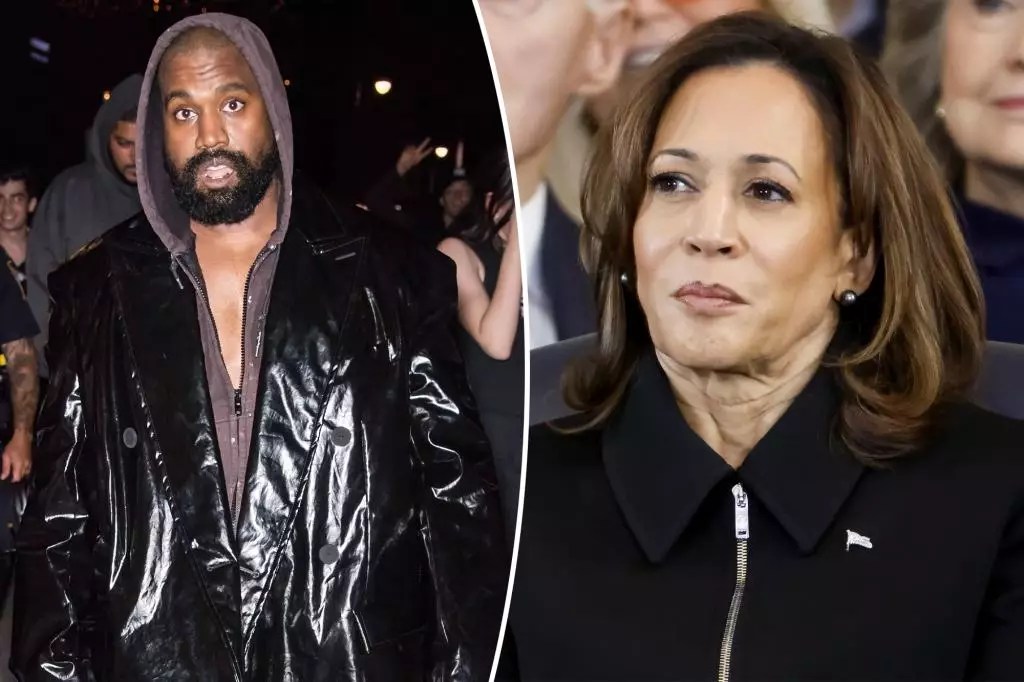In the ever-evolving saga of celebrity controversies, few have proven to be as tumultuous and attention-grabbing as that of Kanye West. Recently, the chart-topping rapper and producer found himself in hot water yet again after posting a sexualized tweet directed at former Vice President Kamala Harris. This incident constitutes a glaring example of how celebrity culture can intersect with political figures in an often disheartening manner, showcasing personal grievances and misguided humor at the expense of public figures.
West’s now-deleted tweet expressed a shocking sentiment, stating, “I used to want to f–k Kamala until she lost. I don’t f–k losers anymore.” This crude remark not only disrespects a significant political figure but also reduces a woman’s identity and accomplishments to an object of sexual desire, which is concerning in itself. Following the backlash, West attempted to deflect responsibility by claiming that he was pressured to remove the tweet, further embellishing his post with nonsensical remarks about control over Black individuals in America. This portrayal perpetuates harmful stereotypes and distracts from the serious implications of his statements.
The audacity with which West juggles derogatory comments with playful banter is troubling. Following his apology—prompted not by genuine regret but likely by the ensuing public outrage—he continued to flaunt a brash sense of entitlement to express views without accountability. This pattern has become somewhat characteristic of West, as he balances on the thin line between artistic expression and outright recklessness.
Kanye West’s history of making provocative and often incendiary comments is not new. The rapper has long been embroiled in various controversies, from his infamous interruption of Taylor Swift at the 2009 MTV Video Music Awards to his previous anti-Semitic remarks. The odd juxtaposition of artistry and rudeness in his social media tirades is a troubling aspect of celebrity culture, where public figures often misinterpret the power of their influence.
West’s behavior raises essential questions about celebrity accountability, particularly in matters that pertain to consent, respect, and women in positions of authority. The notion that someone as influential as West feels entitled to speak in such derogatory terms about a political leader demonstrates a profound lack of understanding about the issue of respect and equality in society. Such perspectives only serve to undermine social progress in the ongoing fight for gender equality.
The incident involving West and Harris underscores broader themes within celebrity culture. It highlights the tendency of some celebrities to trivialize serious political discourse through inappropriate humor or misguided attacks. In an age when social media platforms serve as battlegrounds for political opinions, this kind of behavior can fuel negativity and cynicism.
Moreover, West’s throwback references to his past conflicts with Taylor Swift during his social media rants evoke a sense of nostalgia while simultaneously demonstrating the lack of progress in addressing issues of bullying and disrespect in the entertainment industry. Their lingering feud is a reminder that unresolved conflicts can lead to toxic patterns, which hinder any efforts toward reconciliation or understanding.
West’s tweet not only reflects his personal views but also factors into the larger societal problem of misogyny. Comments that objectify women and dictate their worth based solely on their political success—or lack thereof—expose a societal double standard. The normalization of such views can perpetuate harmful ideologies that shackle women to outdated and damaging stereotypes.
As society grapples with evolving concepts of gender and equality, the remarks made by prominent figures like West evoke urgent discussions about accountability and compassion in public discourse. The dilemma becomes one of ensuring that influential individuals use their platforms to foster understanding rather than division.
Kanye West’s recent comments regarding Kamala Harris symbolize a troubling trend within celebrity discourse, where crassness and provocation take precedence over respect and accountability. As conversations continue around gender, power, and celebrity culture, it is imperative for public figures to recognize the power of their words and the implications they carry within the broader societal context.


Leave a Reply